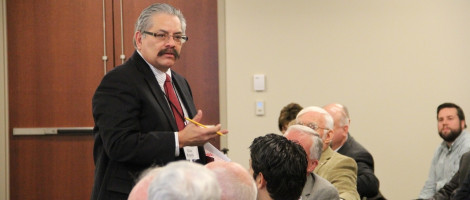Christian Life Commission teaches Texas Baptists to model Christ through advocacy
by Lauren Sturdy on November 17, 2014 in Christian Life Commission

Kathryn Freeman taught a packed room about the steps to becoming an advocate this afternoon at her workshop, "It's Our Government: We Can Make a Difference."
Freeman, the director of public policy at the Christian Life Commission (CLC), emphasized advocacy takes many forms and isn't always tied to the government. Advocacy can look like membership in the local PTA or mission work.
She said the Christian Life Commission recommends "starting with missions," when individuals are trying to decide, which issues they want to get involved in.
"Most churches have a missions or outreach or service pastor who's engaged in your local community, who's doing work in neighborhoods both inside the church and outside the church walls," Freeman explained. "So through that work you will see things that maybe rise to the public policy level. Maybe you have a food pantry that your church offers, and so from that work, working in the food pantry, maybe you'll uncover an interest in…supporting school breakfast programs or organizing a community garden."
 She also talked about the importance of building relationships in the local community, from nonprofits and churches to local elected officials.
She also talked about the importance of building relationships in the local community, from nonprofits and churches to local elected officials.
"Looking beyond your church walls, there's this idea of partnerships and coalitions and joining with other good people that are trying to do the same work," she said.
Freeman said getting to know local elected officials is a crucial first step in making change happen. She encouraged listeners to introduce themselves to representatives by writing letters, even before deciding what policy issues they want to work on.
"Write to them and say, 'I'm so-and-so, I live in your community, I'm one of your constituents and I want you to know I'm praying for you,'" she said. "Or whatever you feel like, just to introduce yourself so that when the time does come when your church or your community needs to go to this person, they know who you are and it's not just, 'Oh, you're just another person coming to me when you need something.'"
She noted how important it is for churches, nonprofits and individual to avoid partisan politics.
 "Most of the issues the CLC works on are not partisan issues," Freeman said. "It's more an issue of what's right and what makes sense for Texas families, especially those who are vulnerable. You have to be intentional and consciously nonpartisan, reaching out to people regardless of their political party and going to talk to them about your issues."
"Most of the issues the CLC works on are not partisan issues," Freeman said. "It's more an issue of what's right and what makes sense for Texas families, especially those who are vulnerable. You have to be intentional and consciously nonpartisan, reaching out to people regardless of their political party and going to talk to them about your issues."
She reviewed the priority issues of the CLC: payday lending, gambling, human trafficking, criminal justice reform, public education, hunger and nutrition and religious liberty.
"The basis of this work for me, and I think for everyone at the CLC, is the gospel," she said. "We believe that as disciples of Christ we're called to do this work. This is a way for us to proclaim the gospel at the capitol in Austin, Capitol Hill in D.C., and to remind people of our responsibility as Christians to care for 'the least of these.'"
Steps you can take now:
- Start serving. From your engagement in missions and community ministry, you'll discover your interests and begin to see where they dovetail with public policy.
- Make contact. Find ways to introduce yourself to your local elected officials. Building relationships is an essential part of being an advocate.
- Team up. Build relationships with other churches and organizations to make the most of your efforts and build on each other's expertise.
- Model Christ. As you engage in policy change, it's important to keep your discourse kind, civil and filled with integrity and humility – especially when speaking with those with whom you disagree.
Lauren Hollon Sturdy serves as Web Content Editor for Buckner International.
Texas Baptists is a movement of God’s people to share Christ and show love by strengthening churches and ministers, engaging culture and connecting the nations to Jesus.
The ministry of the convention is made possible by giving through the Texas Baptists Cooperative Program, Mary Hill Davis Offering® for Texas Missions, Texas Baptists Worldwide and Texas Baptist Missions Foundation. Thank you for your faithful and generous support.
Subscribe to receive stories like this one directly to your inbox.
We are more together.
Read more articles in: Christian Life Commission
More from Lauren Sturdy
- David Hardage highlights Texas Baptist accomplishments in ministry in Executive Director report
- President Jason Burden calls Texas Baptists to daily faithfulness
- Cultural change and pandemic decisions will impact churches for generations, says Ed Stetzer
- Texas Baptists encouraged to embrace unity and make disciples
- 2021 African American Rally attendees urged to have vision beyond what they see